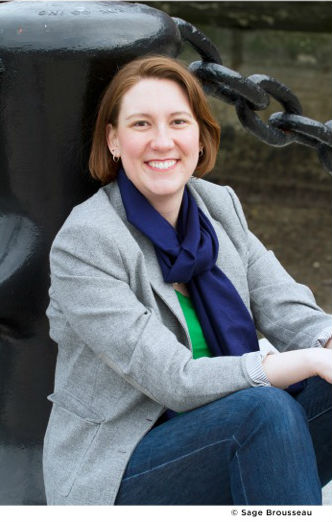 Kate Racculia is the author of This Must Be the Place, and the forthcoming Bellweather Rhapsody, which hits the bookstore shelves on May 13th. Kate talked to Dead Darlings about the inspiration for her new novel, how writing and launching a second novel is different than the first, and the character she wrote for David Tennant. Kate will be celebrating the launch of Bellweather Rhapsody at Brookline Booksmith on May 13, 2014, at 7:00 p.m. She will also be participating at the next Craft on Draft event, where she will be discussing “How do you create your characters?” with Dead Darlings authors Jennie Wood and E.B. Moore.
Kate Racculia is the author of This Must Be the Place, and the forthcoming Bellweather Rhapsody, which hits the bookstore shelves on May 13th. Kate talked to Dead Darlings about the inspiration for her new novel, how writing and launching a second novel is different than the first, and the character she wrote for David Tennant. Kate will be celebrating the launch of Bellweather Rhapsody at Brookline Booksmith on May 13, 2014, at 7:00 p.m. She will also be participating at the next Craft on Draft event, where she will be discussing “How do you create your characters?” with Dead Darlings authors Jennie Wood and E.B. Moore.
Your second novel, Bellweather Rhapsody, hits the bookstore shelves on May 13th. Could you describe the book?
Set in 1997 at the once grand and now-crumbling Bellweather Hotel in the Catskills while it hosts a weekend conference for student musicians, Bellweather Rhapsody is a genre-bendy mystery, thriller, love and ghost story, that’s also as close to a musical in novel form as I could write. On the first night of the statewide music festival, a flute prodigy disappears under mysterious circumstances – was it suicide? Murder? Some kind of prank? Now a cast of eccentrics – including musical twins Rabbit and Alice Hatmaker, their dark horse of a chaperone Natalie Wilson, mad Scottish conductor Fisher Brodie, icy head of the festival Viola Fabian, amateur sleuth-concierge Harold Hastings, and Minnie Graves, who witnessed a murder-suicide at the Bellweather 15 years ago and has returned to face her fears – must not only solve the mystery of the missing flautist, but, after a massive snowstorm traps them all in the hotel, survive the weekend.
What inspired you to tell this story?
I love mysteries. I grew up watching Murder, She Wrote and Matlock, reading Mary Higgins Clark and Agatha Christie, and Bellweather is a direct tribute to my one book to rule them all – Ellen Raskin’s 1979 Newberry award winning mystery The Westing Game, which I read when I was 11. When I sat down to write my second book, it was with the intention of playing in a genre sandbox that I knew and loved.
And I wanted to pay tribute to another of the great loves of my life: music. My entire family is musical – I come from a line of pianists and singers, drummers and guitar gods and trombonists – and I played the bassoon from fifth through twelfth grade. I willingly gave bassoon up in college, but I miss it, and writing a novel about student musicians was a way to relive and remember what I’d loved about playing in orchestras as a kid.
The direct inspiration, however, for writing a mystery set during a student music conference is taken from my life: when I was seventeen, in 1997, my bassoon and I went to the rather down-at-heels Concord resort hotel in the Catskills, where we played in the concert band at the New York State School Music Association (NYSSMA) All-State conference. I wish I could say that the experience was life-changing and -affirming, but honestly, it was lonely (I was the only student attending from my district), creepy (the hotel had to be haunted), and not very exciting (I don’t even remember what we played). Which seemed such a shame! We were playing music; wasn’t I supposed to feel something? In many ways, I wrote Bellweather as a way of reclaiming an experience that disappointed me – an experience that, on paper, might have looked like the zenith of my musical career but in no way represented what I loved about playing music.
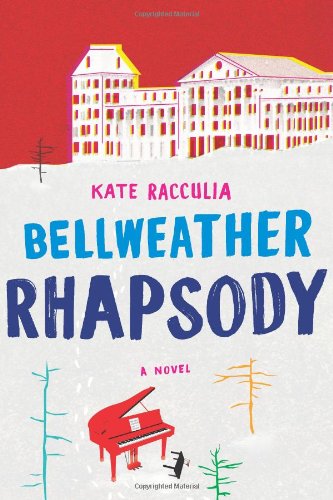 What was your experience writing your 2nd novel, compared to the first? Was it different? Easier? Did your approach or process change?
What was your experience writing your 2nd novel, compared to the first? Was it different? Easier? Did your approach or process change?
It was very different! Which both did and didn’t surprise me – I knew, rationally, that every book is its own little beast, and I knew that, because I was writing more of a mystery-thriller than my first novel (This Must Be the Place is a quirky coming-of-age story), it would feel different. But knowing and living through something are very distinct things.
I wrote a very basic outline of my first novel and detailed character sketches, and I plodded away on it, one weekend at a time, until I had a complete draft that I was happy with. The work was regular and sustaining, an escape from a stressful day job, a bid on a possible future as a novelist – and a means of justifying those student loan payments on my MFA. I wrote in a coffee shop. It got me out of my apartment. I didn’t want to freak myself out about Writing My First Grown-Up Novel, so I deliberately kept it small and manageable.
I started my second novel with even more detailed character sketches – there were eight main characters instead of four – and a more comprehensive outline, because plot was going to be central to the story (and doesn’t come easy for me). I daydreamed about it a lot. I wrote the first chunk of it the summer This Must Be the Place was published; I started a new day job, and let myself focus on that for a while. But the writing itch came back something powerful, and in one torrential deluge, I wrote the last two-thirds between one January and April – in my apartment, where it was quiet and I could concentrate.
Needless to say, my second novel’s first draft was a hot mess. The vast majority of Bellweather happened in revision – which is one of my favorite parts of the writing process, and which, given that the novel is a mystery, makes a certain kind of sense. I solved Bellweather in revision; I picked up all the clues that my subconscious had dropped in and organized and re-organized them into more pleasing shapes. I feel like I worked much harder on Bellweather than I did on Place: because it was a more complicated project, and because the stakes felt higher. I had one book under my belt, and I was happy with it. But with book number two I knew myself better as a writer, and I wanted to swing for the fences.
How about your second book launch – are your feelings different this time around?
I think I’m enjoying it more! The first time, it was incredibly exciting, but I was pretty exhausted from the aforementioned stressful day job. The whole experience left me feeling thrilled and grateful but also kind of stunned. This time around, I’ve got a firmer grip on everything in my life, and I’m so excited to share this book and these characters with the world. Bring it on!
Did you find it challenging to write about music?
I like to try things that seem daunting, and writing about music – in addition to writing a credibly mysterious mystery – was one of the challenges I set for myself with Bellweather. There are shout-outs to pop songs aplenty in the novel, as there were in my first; those weren’t too difficult to weave in. But there are a handful of descriptions of classical performances (of pieces I played, incidentally, with the Syracuse Symphony Youth Orchestra), and those were a higher degree of difficulty. When I was young, I read a series of mysteries set in a youth orchestra, Sizzle and Splat and Second Fiddle, by Ronald Kidd, and I loved how he wrote music as stories. Stories and songs, after all, are made of very similar bits: a line of music has the rhythm of a sentence. Each section of the orchestra has a character, a tone, a role to play. There are reversals and surprises, themes and echoes. I tried to tell each piece of music – like I was telling a story, using heightened sensory details, and always grounding it in the emotions of the character whose point of view I was sharing.
You do such a marvelous job creating whole worlds – and writing from multiple characters’ points of view. Could you talk about what its like to hold so many characters at once? When you begin a new novel, do you begin with one character in mind, or do you think of the larger picture, and all the characters in it? When you are in one scene, are you thinking about what some of the other characters are doing at the same time?
Thank you! When I write, I start with two things: a place or situation, and the people in it. The pleasures of creating people and creating places are closely tied – it’s fun to imagine going somewhere, being a local in your mind, just as it’s fun to imagine visiting the mind of another person. Creating characters – next to revision – is my favorite part of the writing process: I love to imagine other people, getting to know and understand them. Though of course these people, in ways large and small, are all a part of me – they’re themselves, but in their hearts they’re remembering or interested in and wrestling with things about life that I’m remembering or interested in or wrestling with.
From a logistical standpoint, I try to keep track of what’s going on with other characters, but I keep my worldview tight and focused on whomever’s eyes I’m looking through at the moment. There’s always a spark of excitement when characters collide, and you’re suddenly on the other side, looking in. That’s the reward for being so single-character-minded otherwise.
On the same note – are you a writer who works with an outline? Do you think about your characters back-stories beforehand, or do you dive into the story first?
I think about my characters as a series of variables: where are they from – geographically but also situationally? Who is their family? What do they do (for work, for pleasure) and what do they love? What do they fear? What do they want? For Bellweather, because there were so many characters whose fears and desires intersected, I made a chart. I tried to keep the answers to those questions basic and elemental, because part of the joy of writing is discovering the particulars of a character’s backstory.
Take Natalie Wilson, the gun-toting music teacher/chaperone in Bellweather. I knew she was from the Midwest, but had moved around; I knew she was alienated from her husband. She was a music teacher, and she used to love music – but it was tainted for her, and she resents the loss. She was recently involved in a home invasion and a shooting. What I didn’t know, when I started writing, was that she fell in love with David Bowie’s Life on Mars? as a little girl in San Francisco, or that she, as a character, would be a repository for all my anger and resentment for having had my apartment broken into (twice!). Those were discoveries. And they were awesome.
Ruby Falls, the setting of TMBTP, feels like a real place to me, one I want to move to! What fictional world would you like to live in, even if for just for a day or two?
If we’re including fictional televised worlds, I have to say Cabot Cove (the coastal Maine setting of Murder, She Wrote). But as far as fiction goes, I’m drawn to places with a bit of peril. I’d love to tour the Overlook Hotel (on closing day, when it was still full of staff) and take a quick spin around the Oz of the books – or the Oz of Return to Oz – provided I had adequate transportation back to Kansas. The same goes for Jurassic Park; I’d just make sure I got off the island on the last boat.
As far as worlds where I would very happily live out my days, most recently I discovered Fox Corner – the Todd family home in Buckinghamshire in Kate Atkinson’s Life After Life – or any of the anonymous cozy English parishes in the novels of Barbara Pym. And the granddaddy of all retire-to-the-countryside daydreams: I would go to Pemberly, particularly if Lizzie Bennett (or Jane Austen herself) were giving me the grand tour.
Bellweather Rhapsody has been given starred reviews in Kirkus and Publishers Weekly, which named it one of the best summer books. Congratulations! Could you talk about what it is like getting reviewed?
Thank you so much! Getting reviewed is pretty surreal. And a little scary, because a reviewer is a stranger who has nothing invested in you as a person; they have no reason to buck up your feelings. They may be unkind. They may not understand what you were trying to do. But it’s also terrifically exciting, because not only might they like the book, it might say something to them. That’s why (or at least one of the reasons why) we write, after all – to reach a reader, in the same manner we, as readers ourselves, have been reached. No book is for everyone, and you find your readers as they find you. But you can’t reach anyone at all if you never let your book out the door.
My favorite reviews – good or bad – are the ones that read close and judge a book on the merits of what it was trying to be, that implicitly say I engaged and found that engagement worthwhile. That’s a great compliment.
You mentioned you worked (and work) full time while writing both of your novels. Could you talk about how you balance your creative life with your work life? Does one influence the other?
I wrote Place while I was working full time in investment marketing, and I wrote Bellweather while I was working full 40- to 32-hour weeks in non-profit fundraising as a prospect researcher and teaching at Grub Street. I’ve always been a weekend writer; both office jobs required me to sit in front of a computer all day, and there was no way I could handle that at night too. My investment job was stressful and not anything I was particularly invested in (heh, pun intended); consequently, Place was an escape, a way out. My non-profit job was great, supportive and interesting; I didn’t need the psychic retreat of writing, so Bellweather is chock full of anxiety, violence and loss (it’s still fun, I promise), as dark as I wanted it to be.
I taught myself to keep a writing practice the same way I taught myself to go to the gym (though the former has stuck a little better): I made it a habit that fit in my life. Every Saturday and Sunday, I went out and wrote. Some days it was great (writer’s high!); some days it was awful. Some weekends I didn’t write one day or even at all, and I didn’t beat myself up about it – life happens! And that’s okay! – but simply got back on the horse the next weekend. Eventually, it began to feel weird not to write; even if I missed a writing day, I knew that itch, that want, would get me back on track. Now I’m happiest when I’m in the middle of writing a big something, when it’s a part of my pattern, but the practice sustains me even when I’m not actively writing. I know it’s all out there, moving along, and I just have to step back into the stream.
You mentioned that you wrote a character for David Tennant – is it Mr. Tennant, the substitute music and drama teacher In TMBTP? Why did you do it?
The substitute teacher and boardinghouse tenant Ben Tennant in Place does share his last name, though I confess I named him strictly for the pun. In Bellweather, I did write a character with David Tennant in mind: mad orchestra conductor Fisher Brodie. Brodie is a Scot and a former child prodigy, a violently repressed romantic and pianist whose career ended when he lost three fingers. He’s Scottish because I truly believe the Scottish accent is the most musical in the world, because the novel is set in 1997, when Braveheart and Trainspotting were having a moment, and because, when they make the movie (dream big, Kate), David Tennant can use his real accent. In all seriousness, David Tennant is a phenomenal actor; he can play sort of arrogantly intense and crazy magnetic at the same time, and I created the character of Fisher around that energy.
Speaking of David Tennant, what is the most fangirl thing you have ever done? And have you had any experiences of your own fandom?
The most fangirl thing I ever did, I did to David Mitchell: I told him his books were my friends. To which he casually replied, “I suppose I had better write some more?” It was also pretty fangirl of me to take a picture with Margaret Atwood, and, when I was a Beatlemaniac in the mid-90s, to spend an entire semester in art making Beatles-themed paintings. And all those letters and drawings I sent to Bruce Coville as a little kid – which he, because he is a top-notch human being and probably the reason why I ever thought I could be a writer in the first place, replied to with great generosity.
I’ve received lovely emails and cards from readers – and a few charmingly odd ones – but nothing I would qualify as a true expression of fandom: no tattoos, no Tumblrs, no fan art or YouTube mixes …yet.

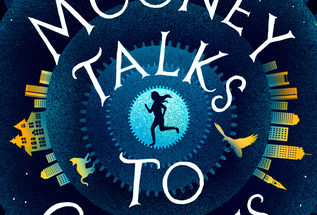
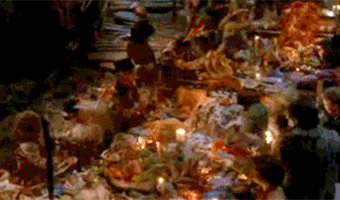
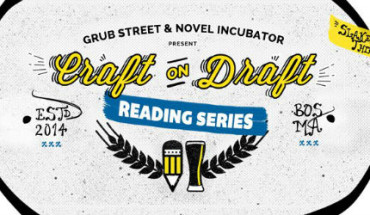
2 comments